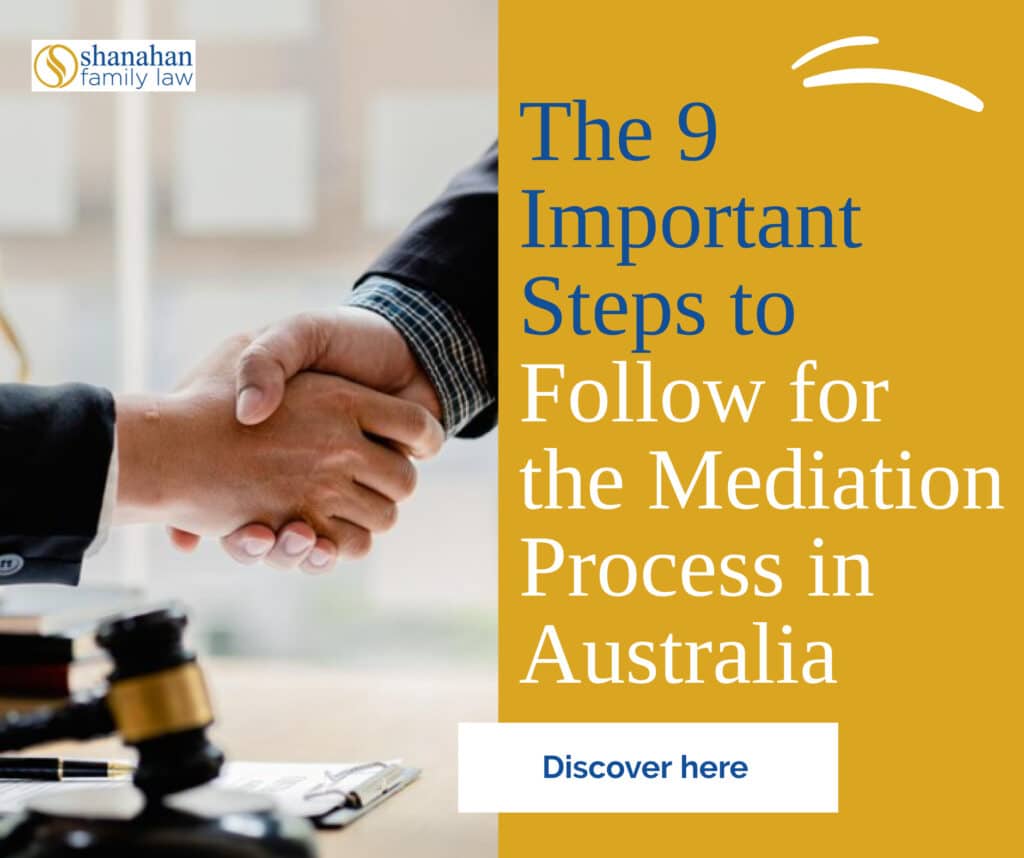The mediation process is where parties in a dispute come together to find a mutually agreeable solution. In Australia’s family law, mediation is pivotal in resolving disputes without resorting to the court system. A neutral third party, known as the mediator, facilitates this process. Mediators do not provide legal advice but instead assist the parties in finding common ground.
Key takeaways 
- Mediation in Australian family law is a structured process facilitated by a neutral mediator. It aims to resolve disputes outside of court.
- The mediator sets a safe, confidential environment where parties can freely express concerns.
- Parties and their lawyers present their perspectives in a joint session. This is followed by private sessions for more open discussions and deeper understanding.
- In high tension situations, the mediator communicates between parties in separate rooms. Doing so ensures continued negotiations.
- After negotiations, an agreement is drafted, reviewed by lawyers, and then signed by both parties. The agreement can serve as evidence in court if needed.
- Mediation offers a bias free, cost effective, and quicker alternative to traditional court proceedings. It emphasises open discussions and mutual resolutions.
1. Introduction and Opening Statement
The mediation process begins with an opening statement by the mediator. This provides an overview of the mediation sessions. It sets the tone for a safe environment where all parties can express their concerns without fear of judgment. The mediator emphasises the confidential nature of the discussions, ensuring that what is said in mediation stays within the confines of the session.
2. Joint Session
Following the opening statement, a joint session is convened. Here, each party and their lawyers present their perspective on the dispute. This is not a platform for accusations but an opportunity to clarify positions and interests.
3. Private Sessions
After the joint session, the mediator may hold private sessions with each party. These sessions allow parties to discuss their concerns more openly without the other party present. It’s a chance for the mediator to understand each side’s deeper interests and concerns.

4. Shuttle Mediation
In situations where emotions run high or parties prefer not to be in the same room, shuttle mediation is employed. Here, the mediator shuttles between separate rooms where each party is located, conveying messages and possible solutions. This method ensures that negotiations continue even when direct communication seems challenging.
5. Negotiation and Finding Common Ground
With insights from the joint and private sessions, the mediator facilitates a discussion aimed at negotiation. The goal is to find common ground and work towards an acceptable agreement for both parties.
6. Drafting the Agreement
Once the parties reach a consensus, the mediator, with the help of the parties’ lawyers, drafts an agreement. This document outlines the settlement terms and each party’s responsibilities.
7. Review by Lawyers
Before finalising the agreement, the parties’ lawyers review the document. They will ensure it aligns with legal standards and represents their client’s interests.
8. Signing the Agreement
After a thorough review and any necessary revisions, both parties sign the agreement. This document can then be presented in court as evidence of a mutually agreed-upon resolution.

9. Post Mediation Follow Up
Some mediations may require follow-up sessions. This ensures the terms of the agreement are being adhered to or to resolve any new disputes that arise.
Benefits of Mediation process sessions
Mediation offers numerous advantages over traditional court proceedings. It provides a safe environment for open discussion, allowing parties to voice their concerns without the formalities of a courtroom. Since the mediator is a neutral third party, there’s no bias, ensuring a fair process. Moreover, mediation is often faster and less expensive than going to court.
Conclusion
Mediation in family law matters is a constructive approach to resolving disputes. It prioritises the needs and interests of the parties involved, ensuring that the outcome is tailored to their unique circumstances. By opting for mediation, parties can avoid court proceedings’ stress, time, and financial burden. This helps find a resolution that aligns with their best interests.
Shanahan Family Law is dedicated to finding mutually beneficial solutions for our clients. We will help you engage with mediation successfully. Contact us today for an initial discovery call.
Related Articles
The above information is intended to be general advice only and is not a substitute for personalised advice. Because it does not consider your individual circumstances, it is not intended to be relied upon, and any loss or damage arising from any such reliance is disclaimed. Any financial or legal decisions should only occur after you have received tailored advice from a legal or financial professional.

